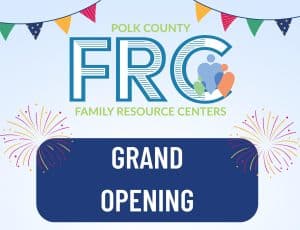The Polk County Family Resource Centers (FRC) will host a Grand Opening event at the Crookston Library on Thursday, June 1, from 4:00 to 6:30 p.m., featuring yard games, door prizes, and a pizza party.
The event will create a chance for families across the county to preview the programs and supports we have to offer parents looking to strengthen their parenting skills and enhance their leadership development.
Polk County is one of seven counties in the State of Minnesota piloting Family Resource Centers (FRC). Polk County Social Services has been meeting with our core stakeholders’ group (Crookston Public School District, East Grand Forks School District, Alluma, Polk County Public Health, CareerForce, Campbell Library, Crookston Public Library, and Tri-Valley Opportunity Council) for about eight months.
“There has been great energy and momentum among our core stakeholders and other collaborative partners, we all share the same vision and mission in serving our community, strengthening families, and supporting better outcomes for children and families,” says Polk County FRC Coordinator, Victoria Ramirez. “We are launching our Crookston site on June 5th, with plans for launching our East Grand Forks site within the next few weeks. We are also engaging in conversations with community partners in future developments to serve our East Polk County communities. I am very excited to be a part of this emerging initiative and to bring this community-based model of support and services to our families and communities in Polk County.”
A careful evaluation of the Community Needs Assessment and Action Plan completed by Polk County Public Health for 2020-2024 was completed along with a Parent Assessment Survey in February 2023. Both data elements showed unmet needs in the Polk County community and which community concerns are a priority including mental health, education, economic stability, and social connectedness.
The overarching goal of FRCs is to strengthen families; enhance parenting skills, build parent resilience, provide education on child development, connect families to resources, build community connections, and prevent child maltreatment.








